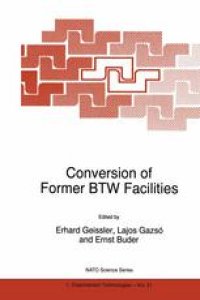
Ebook: Conversion of Former BTW Facilities
- Tags: Private International Law International & Foreign Law Comparative Law, Social Sciences general, Biotechnology, History
- Series: NATO Science Series 21
- Year: 1998
- Publisher: Springer Netherlands
- Edition: 1
- Language: English
- pdf
The development, production, stockpiling and use in war of biological and toxin weapons are prohibited by international law. Although not explicitly stated, the two treaties outlawing such activities, the Geneva Protocol of 1925 and the Biological and Toxin Weapons Convention of 1972, prohibit the continuation of activities previously performed in Biological and Toxin Weapons facilities not justified for prophylactic, protective or other peaceful purposes. Because conversion and other means of cessation of former BTW facilities are not explicitly addressed in the treaties mentioned above the problems involved in conversion ofBTW facilities have thus far only been discussed marginally in the open literature. In times of increased awareness of the danger of biological and toxin warfare (including the increased danger of terrorist use of biological and toxin weapons) it seemed necessary to us to invite experts from different parts of the world to discuss the pros and cons of conversion and the problems involved. It also became obvious to us that the conversion of former BTW facilities should be discussed with respect to the necessity of peaceful internatioual cooperation in areas related to the Biological and Toxin Weapons Convention. An additional reason to discuss matters of peaceful cooperation is that cooperation is explictly requested by Article X of the Biological and Toxin Weapons Convention.
The development, production, stockpiling and use in war of biological and toxin weapons (BTW) are prohibited by international law. However, conversion of BTW facilities has not been dealt with in the existing, open literature on conversion. This is partly due to the fact that BTW programmes to a large degree involve dual-use activities and it is thus difficult to differentiate them form defensive and civilian activities involving pathogenic biological agent and toxins. It is thus also difficult to assess whether or not a BTW facility has actually been converted.
In Conversion of Former BTW Facilities, experts from five countries discuss general aspects of conversion and describe the conversion of former facilities in Germany, the UK, USA, Russia, and Kazachstan.
Audience: Experts in disarmament, BTW problems, biotechnology, health care and related areas.